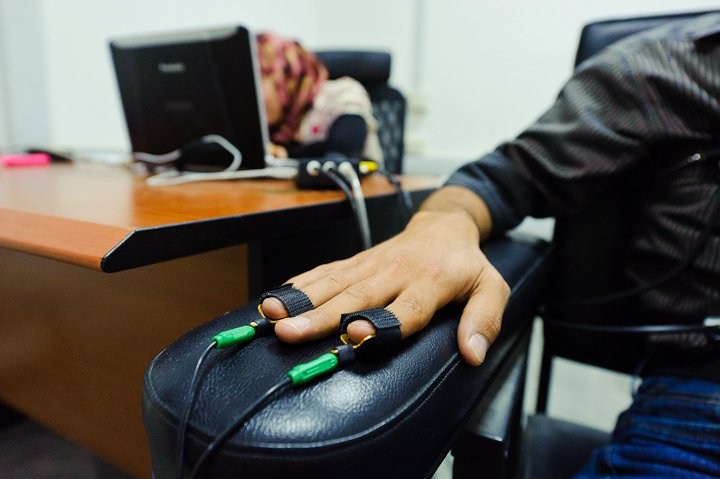Thanks to a new Royal Decree passed just recently, the state will again be able to use lie detector tests in evidence, De Tijd reports.
However the new legislation makes no mention of the questionable reliability of the test results.
The lie detector, or polygraph, makes use of bodily signs recorded from a person being questioned – such as temperature, heartbeat, skin conductivity – which are then correlated with the questions being asked in order to determine whether the person is telling the truth.
But the process has many faults, the most obvious being that a person being questioned will suffer stress as a matter of course, providing no proof of guilt or innocence at all.
For that reason, polygraph evidence is not considered admissible in court in some jurisdictions. In Belgium it can be entered in evidence, but the test can only be administered with the subject’s signed permission.
Belgium is one of the busiest users of the polygraph, with 456 tests carried out in 2019 alone. However the practice came to a sudden halt at the beginning of 2020, when it was ruled that the document a subject must sign to allow the test to go ahead contained insufficient information to allow an informed consent.
Now a new Royal Decree has been produced, but, the paper reports, it contains no mention of the differing views on the technique’s reliability. That, despite the Council of State, giving its opinion on the pending legislation in February, specifically drew attention to the need to stress just that point.
“There is great disagreement and uncertainty about how reliable a polygraph test is,” it said. “For example, the Association of Investigating Magistrates noted that it is not certain that the technology can be scientifically reliable. Although the polygraph reliably records objective physical data, its interpretation remains ambiguous. Moreover, this interpretation, and therefore also the possible reliability of the polygraph test, is largely related to the interview technique used and the questions which the person concerned is asked.”
But now that the decree has been passed, the whole issue of reliability is no longer mentioned.
The office of justice minister Vincent Van Quickenborne (Open VLD) defended the position.
“We did not want to give extra responsibility to the author of the report for whether or not a particular scientific study should be taken into account,” a spokesperson said. “Scientific research evolves, so the estimated degree of scientific reliability can also evolve.”
The fact that the test is not 100% reliable is the reason for the fact that the result of the polygraph test should only be taken into account as supporting other evidence, they said.
“No one can ever be convicted or acquitted on a polygraph test alone. There is also no coercion when using a polygraph test: the person concerned can stop the test at any time.”

